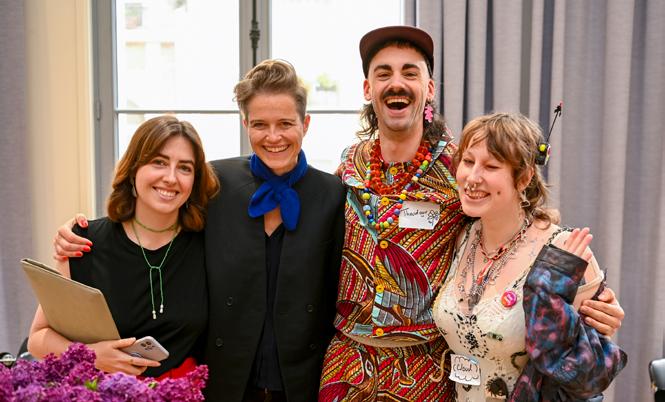
14 minute read
AUP Faculty Breaking New Ground
At The American University of Paris, intellectual curiosity may start in the classroom, but it certainly does not stop there. Across departments and disciplines, faculty are finding creative ways to explore pressing questions and engage deeply as global citizens, often with students working alongside them.
This kind of exploratory, experiential work has received generous support through the newly established John H. Lewis Jr. Faculty Development Fund, made possible by a gift from Cher Lewis. The fund honors the memory of her father, John H. Lewis, Jr., and recognizes her friend Brenda Torney for her longstanding service to AUP.
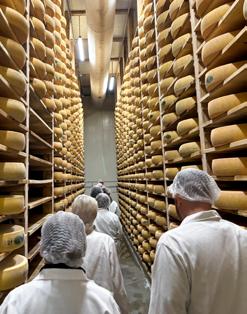
Distinct from AUP’s existing faculty development support, which primarily funds conference travel and research-related expenses, this new fund offers up to €5000 per academic year for small academic and classroombased initiatives.
Since its launch in spring 2024, the fund has already empowered fourteen faculty members and research teams to launch creative initiatives—from field-based projects and collaborative student research to crossdisciplinary workshops and publications.
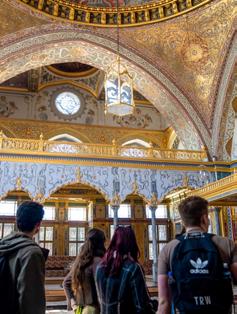
In this feature, we meet six professors and their collaborators whose work reflects the spirit of the fund. Whether they are designing immersive learning experiences, conducting in-depth research, or convening global conversations, their projects share a commitment to curiosity and the transformative power of experiential learning.
Cooperative Taste and the Mise en Commun
Christy Shields, Associate Professor of Anthropology, in collaboration with students Eliza Schwartz ’24 and Annika Lövgren ’25
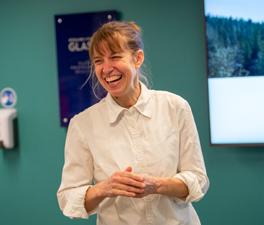
Food anthropologist Christy Shields has spent over a decade exploring the cultural politics of taste, most recently through the lens of one of France’s most iconic cheeses: Comté. Her longterm ethnographic research, partially funded by the Comté industry, led her deep into the world of cooperative production and a unique tasting collective known as the jury terroir, responsible for preserving the quality and taste that define Comté.
Rather than on the food itself, Shields’ courses and research focus on the forms of community that emerge from food-related activities. At the heart of her work is the jury terroir—a sensory panel where farmers, cheesemakers, and regional inhabitants come together to describe Comté’s diverse flavors. What makes this practice unique is its mise en commun (literally “placing in common”)—the same term used when farmers pool their milk each morning to make cheese cooperatively, a process that is required in making Comté cheese.
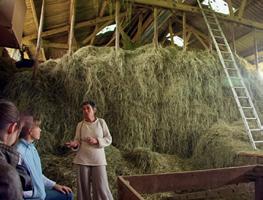
“Instead of ranking tastes as ‘better’ or ‘worse,’ the jury terroir treats all Comté cheeses as different but equal,” Shields explains. “It’s a form of sensory democracy.”
Shields first encountered this practice through the Comté Practicum, annual AUP study trips she organized from 2010-2020 with taste educator Claire Perrot. These immersive experiences introduced students to sensory ethnography while building the relationships that enabled her deeper research.
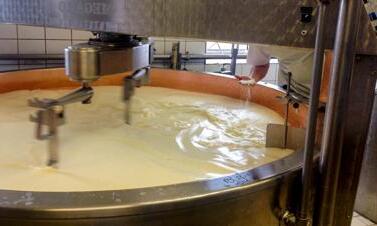
In June 2024, thanks to the John H. Lewis Grant, Shields returned to the Jura mountains with graduates Eliza Schwartz and Annika Lövgren to explore the mise en commun as a form of “everyday utopia.” Rather than viewing the notion of utopia as an impossible ideal, the research team took it as a real practice, an experiment aimed at resisting standardization and creating new possibilities.
“We discovered that when people share sensory experiences equally, without judgment, it becomes transformative,” says Shields. “The farmers told us it changed how they listen to each other, and to their cheeses.”
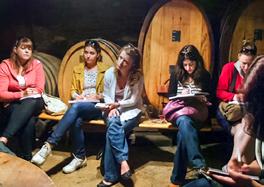
The team’s collaborative research resulted in an article published in Politika magazine, “Cooperative Taste in Comté’s Jury Terroir” and a short film by Lövgren capturing their fieldwork. Their multimodal approach mirrors the cooperative spirit they studied, proving that academic collaboration can itself become a form of resonant utopianism
“What excites me,” Shields reflects, “is how paying close attention to cheese, or another culture, can open our imaginations in productive ways.”
Sustainable Development and Experiential Learning
Tanya Elder, Professor of Communications, in collaboration with students of the M.A. in Global Communications
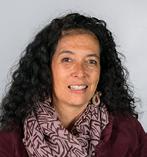
“Students often enter the program with a simplified understanding of sustainability but leave with a much more integrated and complex perspective.”
For Tanya Elder, experiential learning means learning about learning. As Professor of Communications in AUP’s Master’s in Global Communications, Elder has been pioneering experiential learning in sustainable development, anthropology and communications for nearly two decades. Through the Sustainable Development Practicum, which takes students to Auroville or Pondicherry, India, to work with local NGOs, she has crafted an academic experience that immerses students in real-world sustainability projects beyond the classroom.
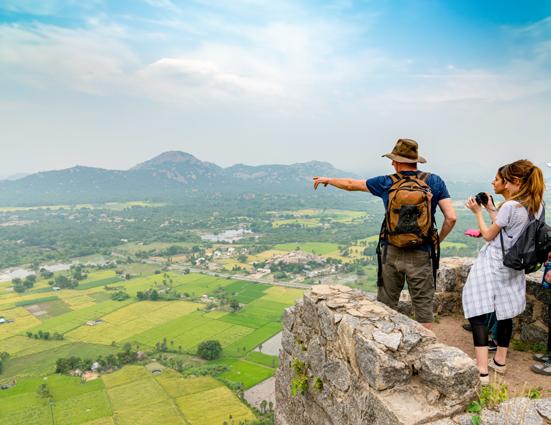
As leader of the Practicum, Elder has always insisted on the need for self-reflection by taking students away from conventional academic tasks, by requiring them to keep field journals, write blog posts (follow the QR code) and conduct on-site interviews.
“The underlying idea behind the Practicum has always been that students learn best when they’re experiencing what they’re learning; the ability to use all their senses, to connect both emotionally and intellectually, is essential,” she says.
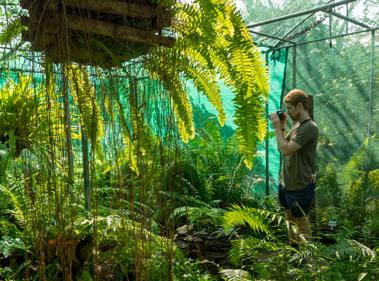
This year, thanks to the John H. Lewis Grant, Elder has taken self-reflection to a new level by turning the focus of her research, with a group of students, to the study of how experiential learning and immersive experiences shape students’ perceptions of sustainability and change and can deepen their understanding of complex global challenges.
The team relies on the blogs, journal entries and final essays that AUP students have written (from 2011 onwards), as well as recently implemented pre- and post-program surveys, which they are coding and analyzing using the qualitative analysis software Quirkos. The goal is to identify key themes such as empowerment, shifting perceptions of sustainability and the emotions experienced during fieldwork.
Thanks to the grant, Elder recently took the team on a working retreat to Nantes, an opportunity to advance the research as well as to build team cohesion and develop the student-professor relationship, which she sees as essential to the success of the research.
Using Ethical AI to Reimagine Children’s Literacy
Claudia Roda, Professor of Data Science, in Collaboration with student Eli Hinson ’25 and Professor Susan Perry
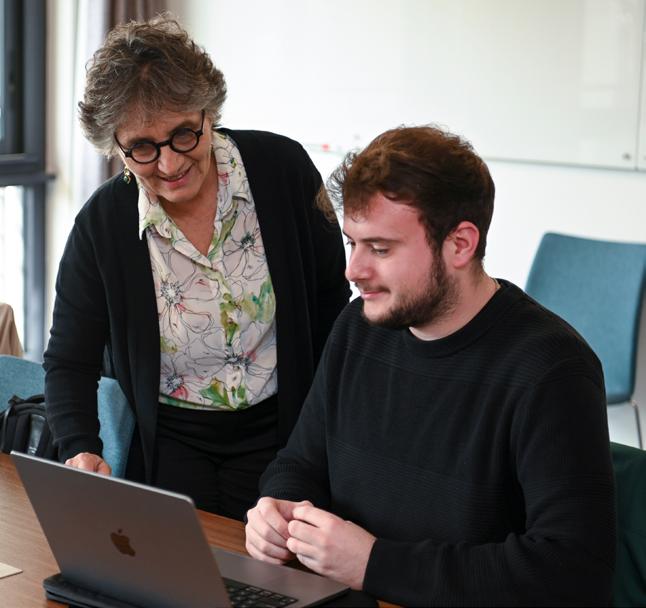
Claudia Roda, who leads the MSc in Human Rights and Data Science, has long spearheaded her discipline, tackling the pressing societal issues posed by the emergence of Artificial Intelligence (AI) in various ways.
With support from the John H. Lewis Grant, Roda is currently leading a research project that combines technology, ethics and education. With student Eli Hinson, who will earn a BSc in Computer Science this year, the two are building a platform that enables children to create personalized books using AI as a way to address the question of representation in the books that students read at school.
The project began during a workshop organized by the UNESCO Chair in Artificial Intelligence and Human Rights, which Roda and her colleague Susan Perry have held since 2024 and which is led by Kyle Zimmer, the CEO of First Book—a US nonprofit organization that reaches 6.5 million children each year in low-income communities across North America by providing books and resources through a network of more than 600,000 educators. During the workshop, students considered the lessons learned from the results of a First Book survey, which found that many young readers in disadvantaged communities still lacked access to books in which they saw themselves reflected and that this had a negative impact on their reading results.
“We immediately thought: what if kids could make their own books with AI?” says Roda.
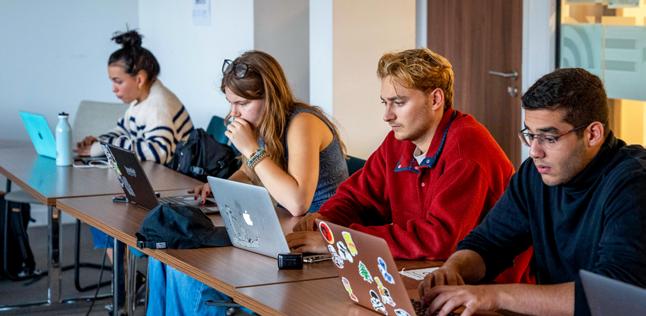
The platform, designed for classroom use, features tools that enable students to create their own characters and collaborate in comprehensive storytelling with teachers. It relies on voice or text input to generate stories with illustrations and professional-looking layouts. Children can then download the final product as a PDF or print a real copy.
The team is currently working on the most challenging aspect of the project: data.
“We really need to prioritize privacy when working with children,” says Roda. “We’re building an ethical pipeline where schools and teachers have control of the data to make sure the privacy of those using the platform is protected,” she adds.
AUP student Eli Hinson, who has been leading development on the project, has recently accepted a software internship in the UK, where he will continue crafting a path for himself in his chosen field.
The platform is expected to launch in classrooms soon, with plans for broader access in the future.
Breaking Down Walls for Education and Creativity
Hannah Taieb, Senior Lecturer of History and Politics
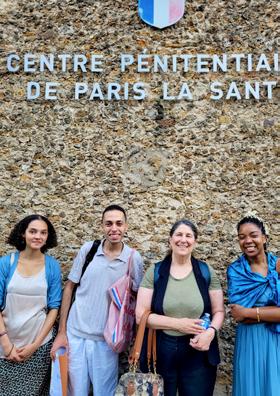
For Hannah Taieb, the John H. Lewis Grant helped enrich an opportunity to move from research to outreach, to bring different kinds of people together in new ways, and to foreground voices that are often silenced. Her ongoing Prison Education Workshop and the recent symposia on the topics of “Teaching and Learning in Prison” (June 2024) and “Creating in and from Incarceration” (June 2025) have served to build connections between students, educators and people who have experienced incarceration.
The Prison Education Workshop is an innovative class that brings AUP students into a shared educational and creative space with people detained at La Santé prison in Paris. After one introductory class at AUP and a prison-organized training session, eight AUP students spend the semester sharing readings, discussions and creative activities with an equal number of detainees. Readings are selected based on the themes emerging from the interactions between the particular participants in the class. In the past, authors studied have included Malcolm X, Bachir Kerroumi, Rigoberta Menchu, Azouz Begag, Jimmy Santiago Baca, W.S. Merwin, Alison Bechdel, Paulo Freire, and Franz Kafka.
In each class session, students and detainees read together as a group, then in small mixed groups, developing creative ways to exchange ideas and reactions. Circle pedagogy, deep listening, and other egalitarian approaches are employed to create a mutually engaging learning experience. In previous workshops, students and detainees collaborated on final projects that were presented at a celebratory event attended by guests from AUP and the prison.
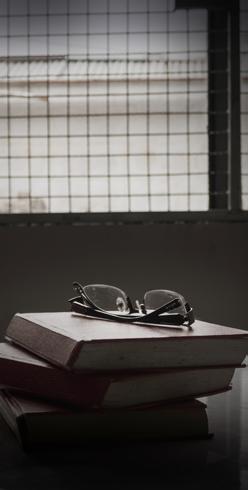
Taieb launched the project with former colleagues Michelle Kuo and Albert Wu and has continued to run it in collaboration with Assistant Professor of Law, Roman Zinigrad, and Raphael Bloch-Laine, Chair of the Department of French Studies and Modern Languages.
“The focus is on experiential learning and the importance of people putting their learning to work through contact with the community,” explains Taieb, who insists, generally speaking, on the “experience” aspect of learning. “When you have experiences, I believe it’s very profound and not always clear what you’ve learned, but your body has learned something by going through space into new contexts with other kinds of challenges,” she says.
This year’s symposium, funded by the grant and organized by the non-profit organization Taieb helped found, Dialogue & Transformation, featured group discussions and presentations by sociologist Oscar Vasquéz, an exhibition by artist Kayrumi including her story of developing her artistic practice inside, a writing workshop by poet Khaled Miloudi, who began writing during his incarceration and continues to lead workshops in prison, and a book presentation by anthropologist Laurent Bazin, who co-authored Moha, le retour du refoulé. Récits du racism d’État with Mohamed Bridji. The group organizing the symposium was led by Friederike Windel of the Department of Psychology, Health and Gender at AUP; Sharie Neira, a sociology PhD student at Paris Cité who has worked extensively in prisons in Peru; and Lauren Vandzandt-Escobar, long-time prison educator and scholar who has taught at Riker’s Island and completed a Master’s thesis on prison education in France and the U.S. This international team opened the door for a truly global vision of prison education and creation. Experiential, hands-on workshops in art and writing, led by creators who developed their practices within, brought people together in a new way.
Taieb and her colleagues plan to continue developing these experiences, which, as she puts it, “help break down some of the barriers between inside and outside.”
Bridging Language Learning and the World in Malta
Rebekah Rast, Professor of English & Linguistics, in collaboration with AUP Professor Ziad Majed and students Tash Karasick ’26, Sofie Mihaylova ’26, Lucie Reed ’27 and Annika Decken ’28
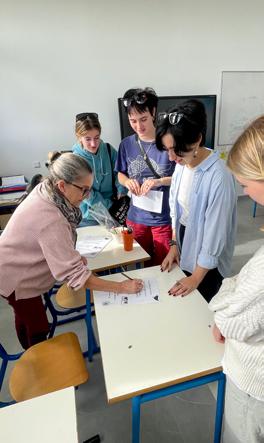
For over 30 years, Rebekah Rast has been a cornerstone of AUP’s Comparative Literature department, where she teaches linguistics and English and helped launch AUP’s linguistics minor over a decade ago.
With a strong interest in language acquisition and multilingualism, Rast has long emphasized the value of hands-on experience in real-world contexts. In recent years, her work has taken students beyond AUP to schools in SeineSaint-Denis and most recently to Malta, where she co-directs a faculty-student research initiative, supported by the John H. Lewis Grant, with Professor Ziad Majed.
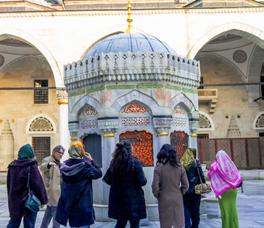
The project builds on a course called Migration: Local and Global, which combines sociolinguistic theory and experiential learning. Originally launched in collaboration with Paris 8 University and French school administrators, Rast began taking AUP students to middle schools in immigrant-rich neighborhoods such as Le Pré-Saint-Gervais where they observed classrooms and helped teach English while reflecting on their own experiences.
Rast then expanded the model to Malta, a key entry point into Europe for many migrants. With support from the grant and the funding from AUP’s Student Government Association, she led a small group of students to multilingual classrooms, including the Migrant Learners Unit, Naxxar Induction Hub, where newly arrived children, often on their way to other destinations, begin to learn English and Maltese.
“Malta is a place where migration is highly visible,” says Rast. “Students get to see firsthand the challenges and possibilities of language learning in this context.”
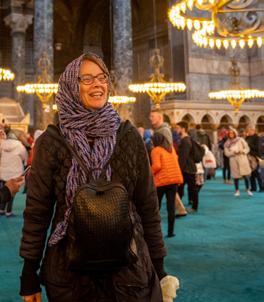
The program is now in its third cycle. Some students have chosen to focus their studies on this experience. One student, pursuing a self-designed major in linguistics, is basing her capstone project on her experiences in Le Pré-Saint-Gervais and in Malta and plans to return this fall. Another, Sofie Mihaylova, created a podcast on migration and language for her final assignment.
Re-Thinking Fashion as a Tool for Social Change
Renate Stauss, Associate Professor of Fashion Studies, in collaboration with students Elsa Darlington G ’24, Fiona Schlumberger G ’24 and Kathryn Galloway G ’24 and alumnae Maddie Czarnik ’21, Michelle Doyle G ’23 and Sara Wynn G ’22

Renate Stauss, Associate Professor of Fashion Studies, is a leading voice in the growing field of critical fashion studies. With a background in the sociology of fashion, her work explores fashion as a social phenomenon deeply connected to politics, ethics and the environment.
With the support of the John H. Lewis Grant, Stauss mentored three master’s students—Elsa Darlington, Fiona Schlumberger and Kathryn Galloway—as they organized AUP’s first student-led symposium on Fashion Communication for Socio-Ecological Change. The event was also supported by three alumnae—Maddie Czarnik, Michelle Doyle and Sara Wynn—and featured speakers including sustainability activist Aditi Mayer and influencer Amélie Deloche.
“There is no such thing as sustainable fashion,” says Stauss. “We work on fashion communications for socio-ecological change. It’s about creating meaning with fashion and thinking about how we can use it to effect change.”
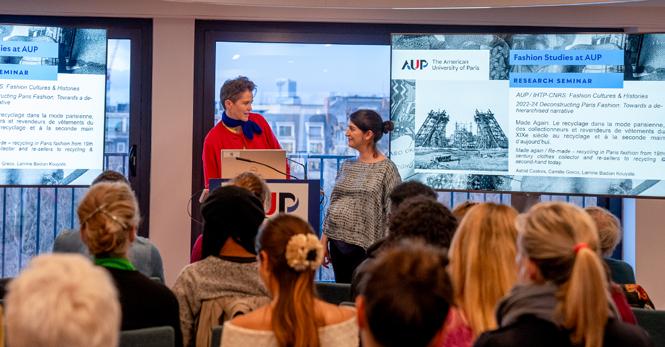
The symposium brought together over 220 participants from eight countries made up of scholars, designers, activists and other professionals. “Creating a space where these communities could collaborate, not just talk, was a real achievement,” says Stauss, who emphasizes that this space allowed students to make direct connections to the field and explains that half of the students she has taught now have careers in the industry.
Strauss’s concept builds on a project co-founded with Franziska Schreiber, fashion designer and professor at the Berlin University of the Arts. The Digital Multilogue on Fashion Education is their initiative and acts as a global forum and outcome-oriented space for fashion educators and students and was launched in response to recent political and environmental crises.
Founded in 2019, The Multilogue aims to “explore and illustrate the diversity and complexity of the field and the practices of fashion education and to foster a greater understanding of its pasts, presents and futures.”
In addition to this project, Stauss’s research focuses on the role of dress in political protest and fashion in refugee contexts, as demonstrated by her current collaboration with historian and AUP professor Sophie Kurdjian, with whom she teaches the seminar Cultures and Histories of Fashion at AUP.

